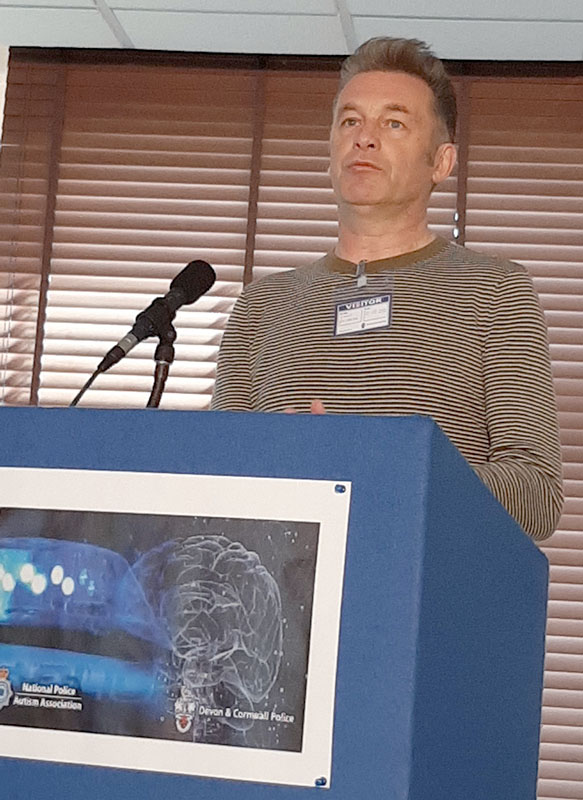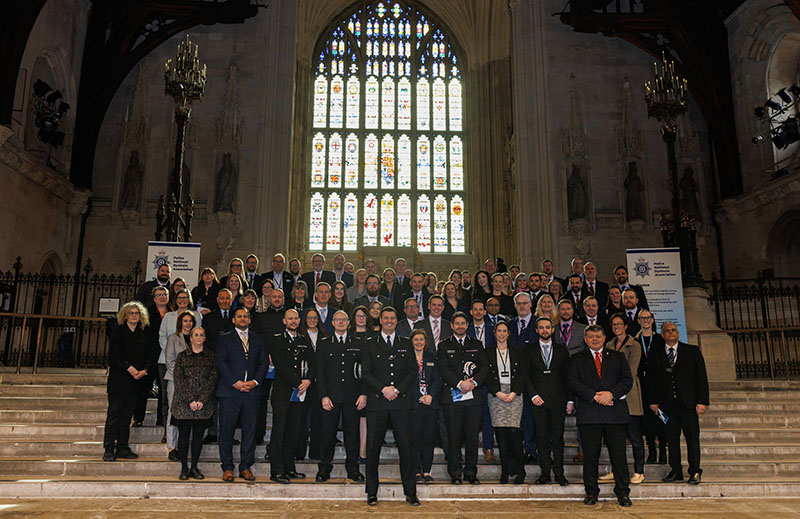On the 10th anniversary of the NPAA, our Chair looks back at what has changed since we launched, and what the future holds for neurodiversity within policing

by John Nelson
Chair | National Police Autism Association
Ten years ago today, I sat down to write a short blog to mark the launch of the National Police Autism Association. Back in 2015, neurodiversity was a bleeding-edge concept in the private sector (the term having been coined by sociologist Judy Singer in the late ’90s), and was virtually unheard of within policing – certainly in relation to police officers who were autistic. I had no idea how our new group would be received, either by police colleagues or the public, who would be able to read about us on our shiny new website and social media pages.
My idea for a national police support network for autistic officers and staff came about following my own diagnosis a few years previously with Asperger syndrome, which at the time was still considered a separate condition to autism. (It would soon be included as part of the autism spectrum.) The Disabled Police Association – which then had only been in existence for three years – was primarily concerned with supporting physical disabilities, injuries and illness. There was nothing for people like me, who needed support and understanding to get the best from our brains that worked a little differently to the majority of the population. Having come from an IT background, I had the idea of forming our network around an online community – a web forum, or message board, which would be open to the extended police family and public and voluntary sectors. This is the model we still use today.
The police service I joined – then as now – had a somewhat conservative (in the traditional rather than political sense) and conformist culture. To be accepted by colleagues and senior officers and to progress within the organisation, you needed to fit in. Equality, diversity and inclusion was an important concept within policing and was not new, but was skewed heavily towards visible difference, with an emphasis on race and ethnicity. (The ED&I input during my initial training was titled ‘Race and Diversity’). The Equality Act was still some years away – equality was laid down in law by a patchwork of different Acts, including the Race Relations Act 1976, Sex Discrimination Act 1975 and Disability Discrimination Act 1995. I was largely unaware of the latter, since my training barely featured disability, and certainly not in the context of my fellow officers – and I was still some years away from my own diagnosis with a ‘disabling’ condition1.
In 2015, the police service still struggled with the concept of equality vs equity – treating everyone the same regardless of circumstances, in comparison to treating people differently according to their needs. Although positive action schemes were well established, these tended only to cater for race and gender. In any case, other than being encouraged to apply for career development opportunities and being offered preparatory coaching, once in the application process or in your day-to-day role, you were on your own. Adjustments were seen as an unfair advantage over other candidates.
I should give special mention to promotion and progression, still a hot topic for our ND members and which caused me a headache in the early days of my career, and led indirectly to my own diagnosis. In common with the public sector and larger private employers, the police service uses a competency-based framework to assess suitability for promotion and specialist roles. The traditional job interview, with open questions such as ‘tell me a bit about yourself’ (which invited some back-and-forth exchanges approaching normal conversation) is replaced by a formal board, with questions on past experience marked according to a scoring matrix, with a pass/fail threshold rigidly applied. Having done well at my first posting as a neighbourhoods officer and pushed towards promotion, I was dispirited to find that I just couldn’t get my head around it. Trying to memorise masses of information along with the competency framework, and moulding it ‘on the fly’ to the question being asked proved next to impossible for me, no matter how hard I tried. It was even more frustrating to see colleagues breeze through the process, sometimes with apparently little preparation.

It took me a few years post-diagnosis to realise what was going on: the ‘secret sauce’ was that the panel were, first and foremost, expecting someone to look and sound the part. If you could do this, you were already halfway there. They didn’t want someone who was hesitant because they were thinking too deeply about what was being asked, or stared into the distance while their brain ran at 100 mph trying to construct a fluent answer. They especially didn’t want anyone who interpreted the questions in an original way. You had to sound interesting: if you bored the panel, they’d swtich off and not listen to you – fail. None of this was officially part of the scoring process, but it was implicitly understood to be how the system worked. (More than one of the many promotion seminars I attended stressed the importance of being enthusiastic when answering a question – I remember at the time being confused as ‘enthusiasm’ wasn’t one of the competencies being tested.)
Another insidious part of progression within policing, and one that held me back on several occasions, was line manager sign-off. To even take part in a promotion process, your line manager had to approve your application – and they could withhold that approval for any reason. Application forms typically came with a free text box where the supervisor could enter anything to support their decision. Of course, line managers could save themselves some work by having a chat with unfavoured candidates in advance of an application going in – “don’t bother applying, you won’t be supported.” The practice was almost impossible to audit from a diversity perspective, and wide open to unconscious bias and deliberate abuse. (One of the first police forces to remove line manager sign-off from the promotion process was Greater Manchester Police – then under the command of Chief Constable Ian Hopkins – because of anecdotal evidence that ethnic minority candidates were being filtered out at this stage.)
The good news was that when our new network came on the scene, there was already a growing realisation that all forms of difference were important. The NPAA was immediately accepted by the College of Policing and the Police Federation of England & Wales as a new staff network, and we were invited to ED&I events along with the established networks representing other protected characteristics. The NPCC 2018-25 Diversity, Equality & Inclusion Strategy referenced the importance of supporting all protected characteristics covered by the Equality Act. (Race was still explicitly prioritised – the Baroness Casey Review and recent BBC Panorama documentary on the Metropolitan Police show why this focus is still necessary.) Although we had support from the top, resistance tended to come from middle management, who were still firmly wedded to the concept of diversity being something they could see.
In 2020, the NPAA with the support of Devon & Cornwall Police and the NPCC were proud to host the first ever Neurodiversity in Policing conference. Colleagues from across the UK came together to share knowledge and look at how to support and encourage neurodivergent talent in policing. We were pleased to welcome guest speakers including naturalist and TV presenter Chris Packham, who spoke movingly about his experiences as an undiagnosed autistic teenager, and Dr Luke Beardon, Senior Lecturer in autism at Sheffield Hallam University. The following year, I was invited to address delegates at the College of Policing Strategic Command Course – a rare opportunity to speak directly to senior leaders about an aspect of difference that they had probably not encountered before.
So what’s changed?
In the last 10 years, neurodiversity has become very much a ‘thing’ in policing – virtually everyone now has at least heard of the term. When the NPAA first started, we were the only neurodiversity support out there – in order to provide a local presence for our members, we started to recruit coordinators – officers and staff who would voluntarily act as a point of contact for autism and neurodiversity in their Force, and whom we encouraged to form local autism and neurodiversity support groups. In 2017, we achieved representation in all 48 police forces across the UK2. In 2025, we no longer have neurodiversity to ourselves, and this is a good thing. Virtually every police force now has some sort of local network supporting neurodiversity, either as a whole or as separate groups covering individual conditions. We’re also no longer the only national neurodiversity network: in 2022 the ADHD Alliance launched, having started as a local ADHD network in the Metropolitan Police; and in 2024, I was honoured to attend the launch at the House of Lords of the Police National Dyslexia Association.

More encouragingly still, neurodiversity support is no longer being left entirely to volunteers: many police forces now have full-time staff providing a support function for ND employees. Some also have staff dedicated to handling requests for workplace adjustments, and able to handle requests through the Access To Work scheme to ensure that officers and staff have necessary equipment and software to perform at their best.
We continue to work closely with our sister neurodiversity networks and with the Disabled Police Association, which represents neurodiversity nationally as a facet of disability. Having just returned from the DPA’s annual conference, it is great to see that neurodiversity is now a permanent fixture on their agenda. Whether a neurodivergent condition is a disability is a question for the individual, but it’s important to remember that we’re all working towards the same goal of enabling colleagues to reach their potential.
Autism hits the mainstream
In the wider world, autism and neurodiversity have become accepted in a way I never foresaw back in 2015, due in no small part to social media. Many people are proud to share their autistic and neurodivergent identities online, and there are a wealth of resources available, particularly on LinkedIn where one does not have to look far to find advice for supporting neurodivergent employees. Two high-profile TV series focused on families with autistic children – The A Word from the BBC, which aired over three series between 2016 and 2020, and Atypical, a US drama from 2017-2021 which focused on a young autistic man starting out in adulthood.
It has become commonplace for well-known public figures to talk openly about their neurodivergence. Chris Packham, our celebrity conference guest, has talked openly about his autistic identity and has since presented several documentaries focusing on neurodiversity. Academy Award-winning actor Sir Anthony Hopkins revealed his diagnosis of autism in his 70’s, and spoke about the challenges of the condition and how it had helped his acting career. For many years now, entrepreneur Sir Richard Branson has highlighted his dyslexia and ability to ‘think outside the box’ as having inspired him to build the Virgin Group into a global business.
For me, two of the most surprising and inspiring autism stories came in 2021. In March of that year, The Times newspaper published an article on Vice Admiral Nick Hine – as Second Sea Lord, one of the most senior officers in the Royal Navy – in which he revealed his autism, diagnosed some years previously, and talked about how his condition had assisted him in his military career. The following month, Commander Simon Dobinson of the Metropolitan Police – now an Assistant Chief Constable with the Ministry of Defence Police – kindly allowed the NPAA to publish a blog he’d written for the Met Police intranet on his autism diagnosis. Both pieces achieved much to break down the stigma around autism, and challenged stereotypes and preconceptions around the condition within professional vocations.
The journey ahead
Although autism, ADHD, dyslexia, dyspraxia and other neurodivergent conditions are far better understood and accommodated within policing now than when I received my diagnosis, there is still some way to go. Our members still report difficulties obtaining adjustments at work, and we often have to direct colleagues to the Police Federation and police staff unions to obtain legal advice on employment disputes. In 2023, we reported on an employment tribunal case involving an autistic officer blocked from firearms training on spurious grounds – one of the first such cases reported widely in the media, and probably not the last.
Promotion and progression remain a problem for some neurodivergent members who struggle to navigate the process and experience difficulty in securing adjustments to achieve an ‘equal playing field’ with other candidates. Sometimes concessions are only made to those taking the first steps on the promotion ladder: at the time of writing, candidates seeking promotion to higher ranks and grades may encounter refusal of adjustments, along with line manager sign-off which is still practised in some police forces. A neurodivergent Chief Inspector wishing to progress to Superintendent may find that their application goes no further than their line manager’s desk, or a quiet word in a corridor.

The challenges of intersectionality – the concept of overlapping social identities – are also becoming better understood. None of us fit into a single protected characteristic, and it’s important to treat people according to their unique needs rather than to force individuals to fit into a particular ‘box’. An officer who is Black and autistic may find support available at work geared towards their ethnicity, when their primary need is around their neurodivergency, for example needing regular access to a quiet place to work. Research has revealed a higher prevalence of autism within the transgender and gender-diverse community, with transgender adults being three to six times more likely to be autistic than the general population; awareness of this link is important in supporting the autistic and trans communities, for example when conducting autism assessments.
In the wider world, ED&I is coming under attack in the US (where it is commonly known as DEI) for perceived unfairness – ironic since it is meant to right the historic well-documented bias against minority groups. The legal framework created by the Equality Act is rather different to the diversity landscape across the pond (positive discrimination, widely practised in the US, is illegal in the UK). In the current climate where online commentators and sections of the mainstream media rail against ‘wokeness‘ (take a moment to click on the link to read the definition of the word), it’s likely that diversity initiatives in the private and public sectors will face increased scrutiny on the grounds of fairness and value for money. The latter represents another irony, since efforts to make workplaces inclusive pay dividends in terms of increased productivity.
Our membership has grown steadily since we launched, reaching 3,000 this year. Many of our members are parents of autistic children, and some started out on their own diagnosis journey after realising that they shared their child’s traits. I’m often asked how many autistic police officers there are; it’s difficult to say with any degree of certainty as many officer colleagues choose not to share their diagnosis or self-identity (and we don’t ask – our membership is open to all police employees and volunteers). My own view from my observations over the years, is that autism is far more common than people realise.
The NPAA will continue to champion neurodiversity, to provide a safe online space for our members, and to offer practical advice and support for those experiencing challenges at work and in their personal lives – I would like to take this opportunity to thank our coordinators for giving their time to help their colleagues. I hope that our network has, in a small way, contributed to a police service that is more understanding and accepting of difference in all its forms.
I will leave the last word to the famously self-depreciating Sir Anthony Hopkins, from an interview with GQ Magazine in 2021. In a culture that tends to categorise everything, neurodiversity – and indeed any form of diversity – is just a fancy label. The unique difference that each individual can make is what’s important. ∎
1. Autism and other neurodivergent conditions may meet the criteria for a disability under the Equality Act, depending on how they affect the individual
2. UK policing comprises 43 territorial police forces covering England and Wales, plus Police Scotland, Police Service of Northern Ireland, British Transport Police, Ministry of Defence Police and Civil Nuclear Constabulary
